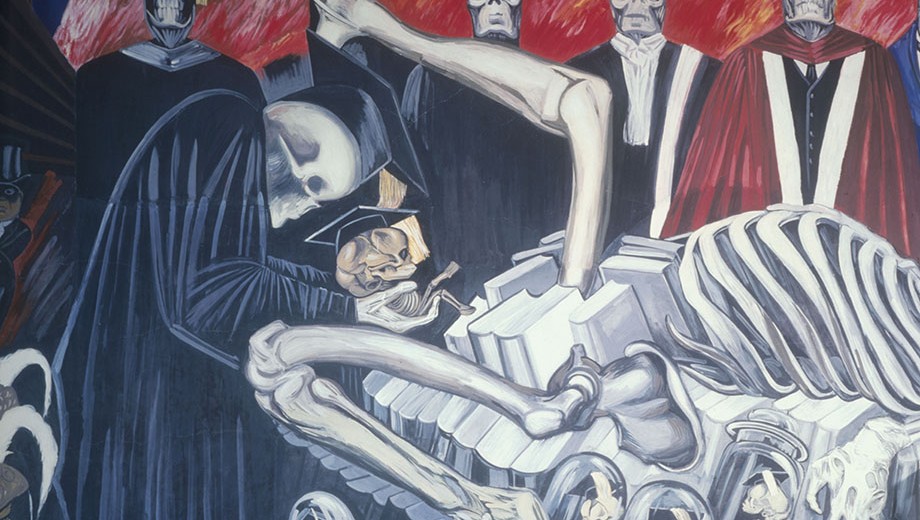Personal interest. Professorial influence. A spark rather than a rational calculation. The paths that lead a graduate student to a dissertation topic are as wide ranging as the topics themselves.
“One day, at a friend’s recommendation, I watched the Japanese director Masaki Kobayashi’s portmanteau film Kwaidan,” says Shengyu Wang, AM’11, a PhD student in Comparative Literature. After researching the short-story collection that inspired the film and finding connections to Chinese supernatural tales, he decided to write about those stories and their flourishing in modern Chinese newspapers and as published English translations and adaptations at the turn of the twentieth century.
Julia Langbein, AM’07, a PhD candidate in Art History, decided to focus her dissertation on Salon caricatures in the Parisian popular illustrated press from the mid-1840s to the 1880s. During her first quarter of graduate school, she took a class on the emergence of public art criticism in the nineteenth century and the professor showed some of the caricatures in passing.
“Something just clicked for me when I saw them,” says Langbein. “When I found out nobody had ever really looked into them, there was no doubt about it. This was the perfect set piece to ask the kinds of questions that interested me, not only to figure out this niche genre, but to think about parody, pastiche, and imitation as forms of criticism.”
Students’ early questions about a potential topic may be too broad, says Dipesh Chakrabarty, the Lawrence A. Kimpton Distinguished Service Professor in History and South Asian Languages and Civilizations. “We want them to eventually make their interests into a researchable proposition, which means getting them to understand both the strengths of the discipline they’ve chosen to work in and, in a way, its limits.”
Most students develop a topic by their third year—a decision that shapes their first experience on the job market and first book project. Even so, when choosing a topic, “you can’t think, ‘The hot conversation is X; I’m going to be in the hot conversation,’” says Lauren Berlant, the George M. Pullman Professor in English. “It’s important to know something about the current market, but it can’t be the constraining horizon.”
Langbein agrees. “You can’t just look at the field and say, ‘There’s a need here,’ or, ‘There’s a gap there.’ For the dissertation writer’s sanity and for the prospects of the project, the question must be, ‘Could anybody else come along and do this project in the same way?’ The closer you are to no, the better.”
Sometimes students finish their course work and still find themselves at a loss for a topic. When that happens, advises Bill Orchard, AM’02, PhD’12, “trust your instincts and pursue those questions and interests that you find yourself returning to.” “When choosing a topic, you can’t think, ‘The hot conversation is X; I’m going to be in the hot conversation.’” Orchard originally came to the University as a Victorianist but shifted gears after writing a paper about Junot Díaz’s short-story collection Drown for a seminar on authenticity. That spurred him to continue exploring representations of Latinos/as in visual and literary forms. His dissertation focused on the relationships between Chicano/a literature and graphic art forms including murals, posters, and comic books.
Orchard’s winding path led to a tenure-track position—he is now an assistant professor of English at Queens College/City University of New York. Yet roughly half of new PhDs with postgraduation employment find themselves working outside the academy. In the humanities and social sciences, the challenging job market and students’ desire to prepare for alternative careers may slowly change the nature of the dissertation, beginning with the topic chosen.
Some researchers are using collaboration and digital humanities tools to connect with wider audiences; a few even argue that producing a single-author, book-length monograph isolates and limits young scholars. “The majority of dissertations, produced in paper and ink, ignore the interactive possibilities of a new-media culture,” writes Stacey Patton in “The Dissertation Can No Longer Be Defended,” a 2013 article in the Chronicle of Higher Education.
The traditional dissertation remains the centerpiece of humanities PhD programs at UChicago. But two doctoral candidates—Jonathan Schroeder in English and Rebekah Baglini, AM’10, in Linguistics—are supplementing their individual dissertation work with an interdisciplinary digital humanities project.
The students’ research partnership looks at the evolution of the word “nostalgia” and utilizes text mining and other quantitative data-analysis methods to create a corpus that tracks different uses of the word in texts. Their goal is to understand how nostalgia became what Schroeder calls “a modern retrospective emotion. Up until the end of the nineteenth century, nostalgia actually names a medical pathology that largely afflicted soldiers and sailors and other people who were indentured into service,” he explains.
The collaborative project supports Schroeder’s dissertation on nostalgia as well as Baglini’s work on stativity—a category of words that express a state or condition. Baglini’s dissertation examines stativity in Wolof, a language of Senegal that has several different constructions meant to connote a feeling like nostalgia. “Subtle meaning differences among these constructions could have important implications for my dissertation work,” says Baglini, “and my collaboration with Jonathan will help to direct my questions about the corresponding concept in Wolof.”
“What I find really great about this is that it’s uncharted territory for both of us,” adds Schroeder. Wang, the student writing about Chinese supernatural tales, shares that spirit of adventure. In choosing his dissertation topic, he took comfort from Santiago’s quest in Hemingway’s The Old Man and the Sea: “Have faith in yourself and keep looking . . . eventually you may catch something big.”
To learn about other dissertations and student projects check out Oysters, Rockefeller, a podcast produced by Julia Langbein and fellow Art History PhD candidate Ingrid Greenfield, AM’07.

